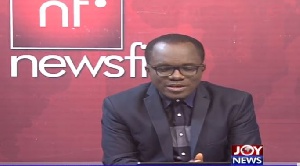Editor and head of the political desk at JoyNews, Evans Mensah, has asked that blame be placed on the Bank of Ghana for the fiscal travesty suffered by five banks because of their inability to reach capital requirements set by the Central Bank.
The affected banks were, uniBank Ghana Limited, The Royal Bank Limited, Beige Bank Limited, Sovereign Bank Limited, and Construction Bank Limited and Mr. Nii Amanor Dodoo of KPMG was named Receiver for the five banks under the umbrella of the newly formed Consolidated Bank Ghana Limited, established by the Government.
He was on Joy News' Newsfile, hosted by Samson Lardy Anyenini.
He likened the BoG’s position on the matter to functioning in a society without law checkers, where individuals were left to deal with matters themselves.
“Until we shift the blame on Bank of Ghana, we are not going to solve the problem. Because as humans as we are, we are fallible and if u leave us to our own powers, we would violate the law,” he said, adding that, “that is why we have the police service to check us at the traffic light.”
According to Evans Mensah, those responsible for the dissolution of the banks did so with impunity because they knew they could escape the grips of the law ‘and until we shift the blame on to the Bank of Ghana, we will not fix the problem,” he was certain.
He accused those in charge of licensing the banks of doing so without any due diligence, supposing that “whoever framed that law and gave the provisional license and then a substantive license thought that within the six months,” the banks would automatically be given a substantive license.
Mr. Mensah claimed that the proper measures were not taken to before the substantive licenses were doled out.
He recalled that the deputy governor said until between the six months when the provisional license is issued and the substantive license, “the BoG has no other responsibilities other than simply looking at whether they have the infrastructure and whether they have the phases. Because the provisional license requirements have been met, it is almost to say it is automatic that the substantive license will be granted,” an assertion he believes is inadequate for a body such as the Central Bank.
The legality of the banks’ documents were not adequately checked to adjudge their validity for even the provisional license.
“Then post the substantive license, then you go into looking at whether the documents they provided were done legally and without false pretenses,” he quizzed with dissatisfaction.
General News of Sunday, 5 August 2018
Source: www.ghanaweb.com

















